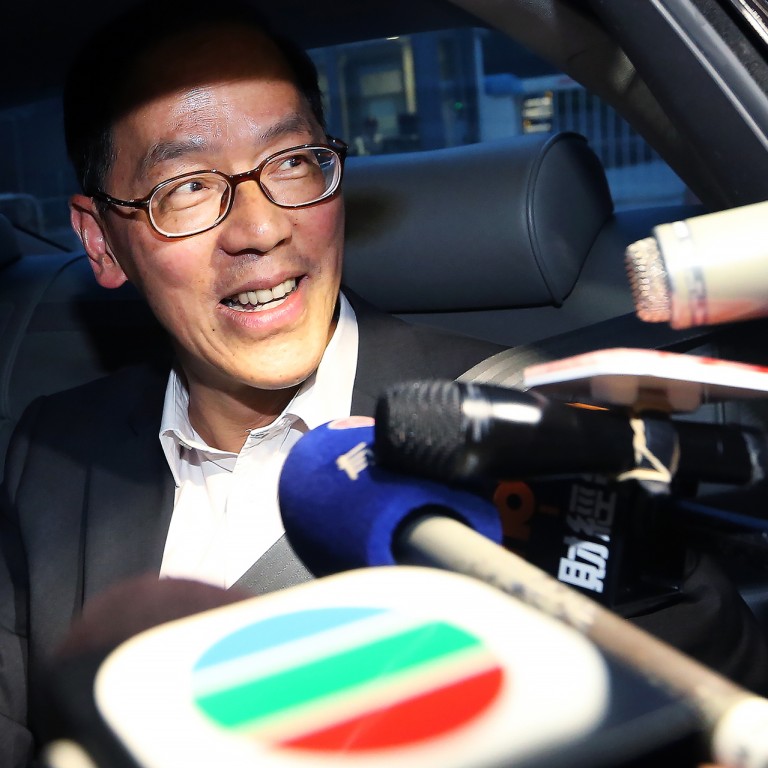
From a jail cell to the corridors of power, outgoing Hong Kong minister Tsang Tak-sing harbours no regrets
Tsang Tak-sing took a bumpy road from outlaw to occupying high office, but harbours no regrets
Tsang Tak-sing caused quite a stir in 2007 when he was made home affairs minister, owing to a criminal conviction from the 1967 riots and his distinct background as a Beijing loyalist.
A Form Six student at St Paul's College at the time of the anti-colonial unrest, Tsang was arrested and jailed for two years for distributing "inflammatory leaflets" in which he condemned the education system of the time.
On more than one occasion since, he has said he harbours no regrets over the actions of his youth. Some say his jail term was political oppression since his offence did not involve violence.
Although the conviction stripped him of a chance to go to university and become part of the colonial elite, Tsang became a rising star inside the pro-Beijing media after walking free from prison in 1969. He was made chief editor of in 1988, and has since also served four terms as a Hong Kong deputy to the National People's Congress.
He raised eyebrows when he became a minister in 2007 with a tirade he delivered during a Legislative Council debate against Anson Chan Fang On-sang, the former chief secretary and pan-democratic politician, when he called her a "sudden democrat".
"Our new legislator today is a former official … [Unless] she believes colonial rule was democracy, I don't know whether she has worked for people's livelihood or officials' livelihood," he said.
His tenure as secretary for home affairs has not been short of controversy. He came under fire for the doubling of the budget for preparation work for the East Asian Games, which eventually cost HK$500 million for Hong Kong to host in 2009.
Tsang is the younger brother of Legco President Jasper Tsang Yok-sing, the founding chairman of the pro-Beijing Democratic Alliance for Betterment of Hong Kong, which later became the Democratic Alliance for the Betterment and Progress of Hong Kong.
The elder Tsang said of his brother's retirement yesterday: "I was surprised when I heard … I don't think it is anything to do with him being unhappy with the government's work."
Asked if he had been forced out, Tsang Tak-sing laughed and said he would not respond to rumours.
The other outgoing minister, Paul Tang Kwok-wai, 59, has been a civil servant since 1978. He was made secretary for the civil service in 2012, overseeing 160,000 public servants. He has served in various departments, including the home affairs department and the now defunct airport projects coordination office, and was promoted to be director of social welfare in 2003.
After decades of successfully navigating the choppy waters of officialdom, Tang tasted defeat in 2013 when he was criticised for failing to unite public servants in a dispute about pay.
As social welfare chief, he also faced thorny issues including the slashing of social worker subsidies.
He is often compared to his older brother, Benjamin Tang Kwok-bun, who was a high-ranking official praised for his role as audit commissioner.
Tsang Sum, chairman of the Federation of Civil Service Unions, accused Paul Tang of not listening to the demands of the civil service unions during his time at the helm. "My impression of him is not very positive," he said. "He didn't take an active approach in listening to our opinions in matters such as the extension of the retirement age."
Lawmaker and former security minister Regina Ip Lau Suk-yee said both Tsang and Tang were unfit to be ministers because they were supposed to interact with all social sectors. She said Tang had been limited by his civil servant way of thinking, while Tsang did not enjoy socialising.
The No2 position in Tang's bureau also changed hands yesterday. Permanent secretary for the civil service Raymond Wong Hung-chiu retired, to be replaced by Thomas Chow Tat-ming.
In a letter to colleagues, Tang said he could now "finally look forward to more time, many travels … and a carefree lifestyle".
"To those who will continue to soldier on, I wish you the best of luck," he said.



